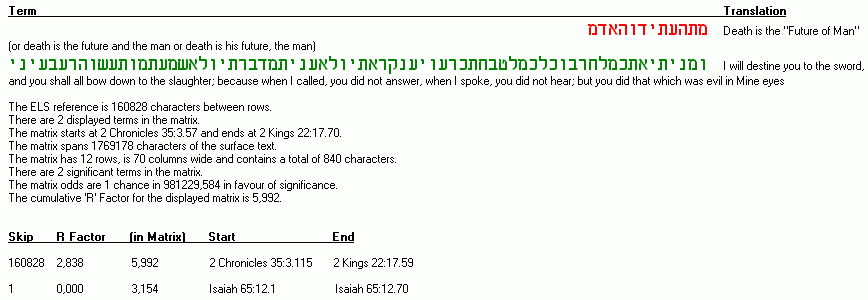
Code by Fab
Death is "the future of man".


Here
is a code found in the Tanach and a wrapped text using the Hebrew spelling
of Teilhard de Chardin's book "the Future of Man".
The lowest skip was extendable to "death is the 'Future of Man!'"
(see attachments) and was crossed by a fitting verse from the surface
text.
Who is Teilhard de Chardin:
http://en.wikipedia.org/wiki/Pierre_Teilhard_de_Chardin
From Publishers Weekly -
http://www.amazon.com/Future-Man-Teilhard-Chardin/dp/0385510721
Nearly 50 years after his death, Teilhard’s classic work on theology, philosophy and science seems remarkably fresh, even prescient. The French Jesuit priest and paleontologist was forbidden to publish this and other works during his lifetime, since its reconciliation of Catholic theology with scientific theory, particularly evolution, was considered questionable by the Church. The essays, written over a 35-year period, show how the upheavals of Teilhard’s era (including two world wars, the first of which he witnessed personally on various battlefields) did little to curtail his enthusiasm for the progress and glorious future of humankind. This edition employs Norman Denny's 1964 translation from the French, and while the language is dated, the ideas shine through. Unfortunately, there is no introduction to place Teilhard’s essays in historical context, nor does the book give any information about his fascinating life and work.
Copyright © Reed Business Information, a division of Reed Elsevier Inc. All rights reserved.
Book Description
The
Future of Man is a magnificent introduction to the thoughts and writings
of Pierre Teilhard de Chardin, one of the few figures in the history
of the Catholic Church to achieve renown as both a scientist and a theologian.
Trained as a paleontologist and ordained as a Jesuit priest, Teilhard
de Chardin devoted himself to establishing the intimate, interdependent
connection between science—particularly the theory of evolution—and
the basic tenets of the Christian faith. At the center of his philosophy
was the belief that the human species is evolving spiritually, progressing
from a simple faith to higher and higher forms of consciousness, including
a consciousness of God, and culminating in the ultimate understanding
of humankind’s place and purpose in the universe. The Church,
which would not condone his philosophical writings, refused to allow
their publication during his lifetime. Written over a period of thirty
years and presented here in chronological order, the essays cover the
wide-ranging interests and inquiries that engaged Teilhard de Chardin
throughout his life: intellectual and social evolution; the coming of
ultra-humanity; the integral place of faith in God in the advancement
of science; and the impact of scientific discoveries on traditional
religious dogma. Less formal than The Phenomenon of Man and The Divine
Milieu, Teilhard de Chardin’s most renowned works, The Future of
Man offers a complete, fully accessible look at the genesis of ideas
that continue to reverberate in both the scientific and the religious
communities.